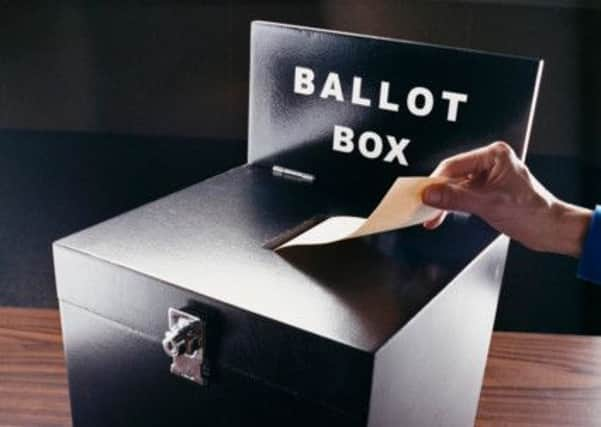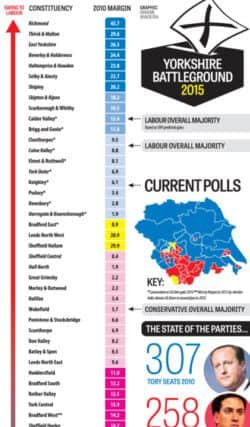Colin Mellors: Yorkshire’s election battleground – with the polls still at deadlock, every seat could make a difference


The event itself was patchy rather than conclusive. It lacked the novelty, and the immediate impact, of 2010 when Nick Clegg’s performance dramatically increased his party’s rating, at least initially.
Despite all the hype, however, he finished with only a marginally increased vote share, and fewer MPs than 2005.
Advertisement
Hide AdAdvertisement
Hide AdIn 2010, the failure of the two bigger parties to achieve an overall majority, rather than any Liberal Democrat breakthrough, determined the subsequent Coalition Agreement with the Tories.


There is every prospect of something similar next month, although one of the other smaller parties might be the deal maker this time.
David Cameron was probably wise to argue for a seven-way debate rather than a series of three-way contests with Ed Miliband and Mr Clegg. It made it more difficult for anyone to emerge as clear winner or, indeed, loser.
Pollsters agreed, however, that SNP leader, Nicola Sturgeon, had performed especially well.
Advertisement
Hide AdAdvertisement
Hide AdMr Cameron would not be disappointed. Significant SNP gains in Scotland would make it extremely difficult for Labour to win outright.
As with most elections, however, it is the economy and who would make best Prime Minister that have dominated the first 10 days of the campaign.
Both are issues where, according to the polls, the Conservative Party has a clear lead.
Probably more significant than the televised debate was the open letter from big business leaders backing the Conservatives’ economic policy.
Advertisement
Hide AdAdvertisement
Hide AdPolls indicate that it is not just the bosses who feel this but that employees in large firms also feel more secure with the Conservatives. Feelings of economic wellbeing appear to have replaced class as the key determinant of voting.
Despite five years of spending cuts, Labour has still to dent the Conservative poll lead in respect of the question of “who is best placed to run the economy?”
Instead, the parties have traded contradictory figures, with each purporting to show whether people are better or worse off than they were five years ago.
What matters, of course, is whether people feel that things are improving.
Advertisement
Hide AdAdvertisement
Hide AdLabour has yet to shift the campaign to territory where they are stronger – concerns about further austerity, uncertainties about where future cuts will hit and in whose hands the NHS will be safest.
Europe, and the proposed referendum, has barely touched the voters’ minds.
This has meant that Labour has not had the opportunity to highlight an issue where they could forge common cause with at least some sections of the business community.
On Tuesday, Tony Blair was brought back to fly the European flag. The next few days will show what, if any, impact this has had on the campaign.
Advertisement
Hide AdAdvertisement
Hide AdIn similar vein, immigration – a prominent issue in last year‘s European elections – has also featured little.
The net result is that the opinion polls continue to flat-line, as they have done for several months.
There has been a small fillip for the Conservatives who have edged in front of Labour by one point (34 per cent compared with 33 per cent). Liberal Democrats and Ukip remain static on eight and 13 per cent respectively. The outcome would be another hung Parliament.
Closer to home, some familiar Yorkshire faces will be missing from Westminster after May.
Advertisement
Hide AdAdvertisement
Hide AdWilliam Hague is retiring from the Conservative benches after 26 years, alongside Anne McIntosh, following her de-selection in Thirsk and Malton.
Labour will be losing a large raft of MPs including Mike Wood (Batley and Spen), Gerry Sutcliffe (Bradford South), Austin Mitchell (Great Grimsby), George Mudie (Leeds East), David Blunkett (Sheffield Brightside and Hillsborough), Meg Munn (Sheffield Heely), and Hugh Bayley (York Central).
Yorkshire will be a key battleground and its key seats are depicted on the chart.
Translating vote shares into seats is now much more difficult in the context of four-way contests in many constituencies.
Advertisement
Hide AdAdvertisement
Hide AdHowever, in broad terms, Conservatives need a uniform swing of around two per cent from Labour to win outright.
In Yorkshire, this would imply Labour losses in Great Grimsby, Morley and Outwood, Halifax and Wakefield.
By contrast, Labour requires a swing from the Conservatives approaching four per cent to become the biggest party after May 7. This would mean picking up seats such as Dewsbury, Pudsey and Keighley from the Conservatives as well as Bradford East from the Liberal Democrats.
For outright victory, Labour would also be looking to win Elmet and Rothwell and Cleethorpes.
Advertisement
Hide AdAdvertisement
Hide AdGiven likely losses to SNP in Scotland, Brigg and Goole and Calder Valley would also need to be in their sights (this is depicted as the “adjusted target” in the accompanying chart).
Some marginal Conservative and Labour seats will be secure because the Liberal Democrats’ rating has dropped dramatically.
This time, Liberal Democrats will need to fight hard to hang onto existing seats.
With a majority of just 365 votes, Bradford East is their fourth most vulnerable seat nationally.
Advertisement
Hide AdAdvertisement
Hide AdLeeds North West looks safer with a majority of 9,000 but, given the size of the student vote, much will depend on how badly they have been damaged by the fees issue. It is their 10th safest seat.
Even safer, notionally, is Sheffield Hallam, their third safest seat. Although a recent poll of the constituency suggests that Mr Clegg could lose, it would be a bitter personal blow.
Twelve months ago, local election results suggested that Ukip could have won four seats from Labour – Rotherham, Rother Valley, Penistone and Stocksbridge and Great Grimsby – and a fifth, Cleethorpes, from the Conservatives. They would also have been a close runner up in Don Valley.
Their rating has halved since then and, while South Yorkshire and North East Lincolnshire are still the places to watch, Ukip’s impact might be significantly less than seemed possible 12 months ago.
With four weeks remaining, deciding who can be trusted to run the economy still holds the key to Downing Street.
Colin Mellors is Emeritus Professor of Politics at the University of York.